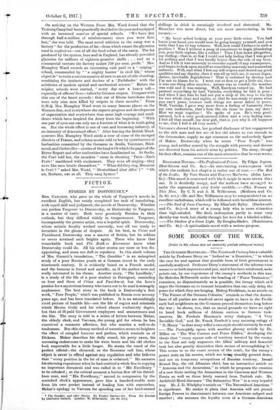FICTION.
STORIES BY DOSTOEVSKY.*
Hue. GssorErr, who gave us the whole of Turgenev's novels in excellent English, has nearly completed her task of translating, with equal skill and judgment, the novels of Dostoevsky. Whether one prefers Turgenev to Dostoevsky, or Dostoevsky to Turgenev, is a matter of taste. Both were genuinely Russian in their outlook, but they differed widely in temperament. Turgenev, incomparably the greater artist, was a hopeful spirit. Dostoevsky, whose artistic faculty worked unevenly, was all too ready to luxuriate in the gloom of despair. At his best, in Crime and Punishment, Dostoevsky was a master of fiction, but he seldom or never attained such heights again. Those who know that remarkable book and The Broth.rs Karatnazoo know what Dostoevsky could do. All his other stories are more or less dis- appointing, and some are dull or repulsive. In this ninth volume of Mrs. Garnett's translation, "The Gambler" is an uninspired study of a poor Russian youth at a German resort in the early nineteenth century. It is evidently based on a French model, and the humour is forced and metallic, as if the author were not really interested in his theme. Another story, "The Landlady," Is a study of the life of a poor student in Petrograd, reminding us here and there of Crime and Punishmtnt, but the hero's passion for a mysterious beauty who turns out to be mad is strangely unpleasant. The best story in the book is Dostocvsky's first work, "Poor People," whielt was published in Russia over seventy years ago, and ham been translated before. It is an astonishingly vivid picture of humble life—not the life of rogues and criminals which Maxim Gorki and his school almost exclusively depict, but that of ill-paid Government employees and seamstresses and the like. The story is told in a series of letters between Maker, the elderly clerk, and Varvara, the young girl for whom he has conceived a romantic affection, but who marries a well-to-do tradesman. But this clumsy method of narration seems to heighten the effect of mingled humour and pathos, which reminds us of Dickens. Maker describes his daily round, his petty cares, his unceasing endeavours to make his worn boots and his old clothes look respectable for a little longer. He state.] the creed of the perfect official—the chinoonik, as the Russians call him, whose object is never to offend against any regulation and who believes that "every position in the lot of man is ordained." He narrates his alarming experience when he had omitted a whole line in copying an important document and was called in to "His Excellency" to be rebuked: at the critical moment a button flew off his thread- bare coat, and "His Excellency," moved to compassion by the wretched clerk's appearance, gave him a hundred-rouble note from Ids own pocket instead of loading him with reproaches. Maker's apology to Varvara for *ending one of her hard-earned • • The Gambler, and other Marie*. By Fyoder Dostoersky. From the Russian by Constance Garnett, London: W. Ilelmmesiasa. lea ed, nal
shillings in drink is amusingly involved and rhetorical. Mr. Mieawber was more direct, but not more unconvincing, in his
OXCUBCH —
"My heart ached looking at your poor little coins. You had burnt your hand, you would soon be going hungry yourself, and you write that I am to buy tobacco. Well, how could I behave in melt a position ? Was I without a pang of conscience to begin plundering you, poor little orphan, like a robber ! Then I lost heart altogether, my darling—that is, at first I could not help feeling that I was good for nothing and that I was hardly hotter than the sole of my boot. And so I felt it was unseemly to consider myself of any consequence, and began to look upon myself as something unseemly and somewhat indecent. Well, and when I lost my self -respect and denied my good qualities and my dignity, then it was all up with me, it meant degra- dation, inevitable degradation ! That is ordained by destiny and I'm not to blame for it. I wont out at first to got a little air, then it was one thing after another; nature was so tearful, the weather was cold and it VMS raining. Well, Emelyan turned up. He had pawned everything he had, Varinka, everything he had is gone : and when I met him he had not put a drop of the rosy to his lips for two whole days and nights, so that he was ready to pawn what you can't pawn, because such things are never taken in pawn. Well, Varinka, I gave way more from a feeling of humanity than my own inclination, that's how the sin came to pass, my dear ! How we wept together ! We spoke of you. He's very good- natured, he's a very good-natured fellow and a very feeling man. I feel all that myself, my dear girl, that is just why it all happens to me, that I feel it all very much."
Varvara's shrewd letters, her gradual disclosure of her engagement to the rich man and her use of her old adorer to run errands to the dressmaker, supply an apt comment on the melancholy figure of Maker. Dostoevsky when he wrote "Poor People" was young, and neither soured by the struggle with poverty and disease nor diverted from his artistic aims by politics. The story, though his first effort, remains one of the most attractive that he ever wrote.




























 Previous page
Previous page